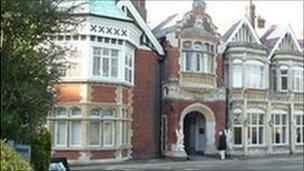Declassified Bletchley Park document handed to codebreaker
- Published

Codebreakers at Bletchley Park played an important role in Allied victory in World War II
A formerly secret government document has been presented to the only surviving wartime codebreaker who wrote it.
The declassified document was handed by intelligence agency GCHQ to codebreaker Mavis Batey at Bletchley Park Mansion, Buckinghamshire earlier.
Mrs Batey, 90, had been told the report, which she last saw 66 years ago, would never be declassified.
She wrote it with her late husband Keith, Margaret Rock and Peter Twinn.
Entitled the History of Abwehr Codebreaking, the document was dubbed "Batey, Batey, Rock and Twinn" after its four authors.
It related to the German secret service, the equivalent of MI6.
Bletchley Park was a government codebreaking centre during World War II and played an important role in the Allied victory.
'Have a go'
At the end of the war each Bletchley Park section wrote its history.
Reports covering German naval, army and air force codebreaking have already been released but the secret service report remained classified.
Mrs Batey was one of only about three skilled female cryptanalysts at Bletchley Park, together with Margaret Rock and Joan Clarke.
Then Mavis Lever, she was 18 when she arrived at Bletchley in May 1940.
She worked under renowned codebreaker Alfred "Dilly" Knox, who greeted her with the words: "Hello, we're breaking machines. Have you got a pencil? Here, have a go."
Naval battle
Simon Greenish, director of the Bletchley Park Trust, said Mrs Batey was a national heroine.
"Mavis was one of the elite at Bletchley Park. She's one of the brightest ladies I have ever come across," he said.
"She was the person who broke the Italian codes that led to the Battle of Cape Matapan, where the Italian navy met the British navy and suffered huge losses."
He said her work was so advanced it was still relevant today, which was why the document had only just been declassified.
Mr Greenish said the presentation was especially poignant as the document allowed Mrs Batey to find out about what her husband, who died last year, had been working on during the war.
As a married couple, they were put on different sections at Bletchley Park and forbidden from talking about their work.
- Published27 April 2011
- Published15 September 2010
- Published5 June 2010